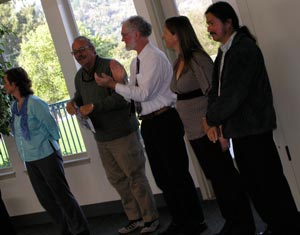The vanpool program at UCSC started in 1992 with two vans coming from Watsonville. Now, the program has ballooned to 22 vans transporting campus employees from as near as Live Oak and as far-flung as Palo Alto.
For accomplishments in reducing single-passenger auto use such as this, the United Way honored UCSC's Transportation and Parking Services (TAPS) Department as a "Community Hero" at its 2007 Community Assessment Project Year 13 press conference and celebration November 19, held at Holy Cross Parish Hall in Santa Cruz.
The Community Assessment Project study reports annually on the status of Santa Cruz County issues, ranging from the economy and health care to crime, education, and the environment. The project also each year honors county residents, or Community Heroes, who have contributed to the community through their work or volunteering.
Getting the recognition felt "great," said Larry Pageler, director of TAPS.
"Our transportation programs are a model that can be used at other universities, but also in the community," Pageler said.
The Community Assessment Project of Santa Cruz County (CAP) is a collaborative project to measure and improve the quality of life in the county. It's been sponsored over the past 13 years by a consortium of public and private health, education, human service, and civic organizations convened by the United Way of Santa Cruz County.
Twenty-five Community Heroes were recognized at the ceremony in the categories of economy, education, health, natural environment, public safety, and social environment. TAPS was honored in the category of natural environment.
This year, United Way got more nominations for Community Heroes than ever before, with more than 100 suggestions coming in across all categories, said Mary Lou Goeke, executive director of United Way of Santa Cruz County.
TAPS was nominated for the award by Virginia Johnson, chief executive officer of nonprofit environmental consultancy Ecology Action.
"They do a wonderful job of transportation demand management--managing the demand of the trips coming onto the campus, parking on the campus, and mobility around the campus," said Johnson. "They have the right mix of incentives and disincentives to get folks to really embrace sustainable transportation."
Enrollment at UCSC has increased 30 percent since fall 2000, but average daily vehicle traffic on campus has remained about the same, according to Pageler.
UCSC's transportation work has implications beyond the campus, he said.
The university's partnership with car-sharing service Zipcar, vanpools, bike shuttles, and use of transit "can translate into better transportation options for the entire county, the region, and the state," said Pageler.
Next up for the department is a focus on reducing the threat of global warming.
"How can we better determine where we can spend our money to get the best benefit in greenhouse gas reduction?" said Pageler.
When asked how the department had won the award, Pageler credited the "terrific staff."
"The people who drive the buses, get the grants, and manage parking at the events," he said. "It's been terrific to have such a wonderful and supportive staff, and a campus that truly cares about these issues."



